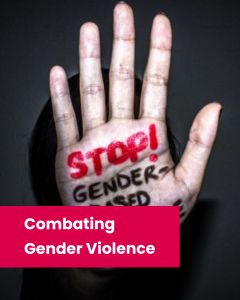Diverse communities missing out on gender violence support – study
Emerging refugee and migrant communities in Australia are being left behind when it comes to resources to tackle the scourge of gender-based violence, a survey of community leaders has found.
A focus group of 30 community leaders in 21 key cohort migrant and refugee groups say their communities are not getting support to combat gender violence.
Half (50 per cent) of the community leaders surveyed said women in their communities did not have adequate access to access to information on gender violence, prevention campaigns, legal rights and early intervention strategies. Thirty per cent said women in their communities had access to just “a little” information.
 Fifty-three per cent of leader said women in their communities did not have adequate access to gender violence survivor support services and 57 per cent said their communities had worse access to solutions to gender violence than the broader community.
Fifty-three per cent of leader said women in their communities did not have adequate access to gender violence survivor support services and 57 per cent said their communities had worse access to solutions to gender violence than the broader community.
When it came to finding refuge in the event of gender violence, 57 per cent of leader said women in the communities had no access and 10 per cent had “some” access, while 34 per cent said there was access or at least “some” access.
However, most (80 per cent) community leaders said informal support was available to gender violence survivors within their communities.
Talking about gender-based violence is also an issue for many dovers communities, the survey found with 47 per cent saying conversations were “difficult”. Thirty per cent said the conversations were “somewhat difficult,” 10 per cent said they were “somewhat easy” and 13 per cent said they were “easy”.
Most (53 per cent) community leaders said that gender-based violence was not becoming more prevalent but only 23 per cent said it was becoming less prevalent.
Asked to identify the drivers of gender-based violence, the community leaders identified fiver factors: Financial stress/poverty (63 per cent); Effects of displacement (47 per cent); Trauma/life experience (43 per cent); Male cultural dominance (37 per cent); Alcohol/substance abuse: (27 per cent).
The survey generated several recommendations, including a need for more in-language information for communities about how to access support and create agency in the prevention of gender violence as well as programs co-designed and led by multicultural communities themselves.
Also identified was the need for an holistic suite of interconnected interventions responsive to the cultural norms and practices of individual communities that listen to, and learning, from communities as to what works.
All of the participants said a ramp up community capacity building would result in communities being better placed to support their own members.
The survey comes after more almost $1 billion in extra funding for gender-based violence was announced in the 2024 federal budget.
Korean community leader and academic Hyein Ellen Cho said it was clear that mainstream programs to tackle gender-based violence were not reaching diverse communities.
“The survey results come as no surprise to me. I hear this all the time from the community but also in the research I do on migration and gender-based violence,” Ms Cho said.
“As a migrant woman myself, I work extensively with emerging communities. However, there is a serious disconnection between mainstream services and systems and migrant and refugee communities, particularly newly emerging ones.
“Although we are just starting to learn more about the issues within migrant and refugee communities, there is still a lack of understanding and commitment to the lived experiences of migrant and refugee communities. Often, we, as migrant and refugee communities, are lumped in together in policy and practice,” Ms Cho said.
General Manager of Education and Participation at migrant and refugee settlement agency AMES Australia Mirta Gonzalez said resources were not consistently or sufficiently getting to those actually doing the work with highly vulnerable CALD women and communities who fall between the cracks.
“Some things clearly are not working as intended, and this is not just the result of limited resources. It has more to do with the way in which we understand our society and consequently design and fund domestic and family violence response services and prevention initiatives,” Ms Gonzalez said.
“The reality that we live in an increasingly diverse society seems to still eludes us. And, despite a more evolved understanding of intersectionality, when it comes to planning services, we still hold on to the imaginary notion of a largely mono-cultural society with intractably complex diversity at its margins.
“At a practical level, this means that programs need to be co-designed and led by multicultural communities themselves.
“They should be dedicated and tailored programs – not just crumbs from mainstream programs; simply translating information sheets is not enough. We need a fundamentally different approach to supporting victims, because women from CALD communities fleeing violence often have nowhere to go or they face cultural barriers in wanting to leave situations of violence.
“This is a complex undertaking that requires a number of interconnected interventions; and requires listening to, and learning, from communities as to what works,” Ms Gonzalez said.












